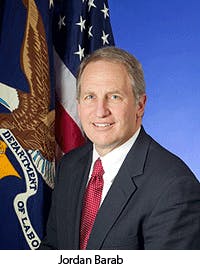BP to Pay $13 Million in OSHA Penalties, Agrees to Abate Lingering Texas City Refinery Violations
Secretary of Labor Hilda L. Solis announced July 12 that OSHA has reached a settlement with BP Products North America Inc. to resolve hundreds of process safety management violations identified at the company's Texas City, Texas, refinery in 2009. BP will pay more than $13 million in OSHA fines and agree to resolve all outstanding citations by the end of 2012.
"We want all of cited hazards to be corrected," said Solis during a July 12 press conference call announcing the agreement. "We want the men and women working at Texas City to go home safely at the end of the day."
On March 23, 2005, a massive explosion at BP's Texas City refinery killed 15 employees. In the aftermath of the incident, BP faced harsh criticism of its safety processes and a $21 million OSHA fine – the largest fine the agency had issued at the time.
A 2009 OSHA follow-up investigation revealed that BP had failed to correct all safety violations as outlined in the 2005 agreement, causing OSHA to issue 270 failure-to-abate notices. BP paid a $50.6 million penalty in 2010 to resolve those issues. The 2009 follow-up investigation also prompted OSHA to cite BP for 439 willful violations of the process safety management (PSM) standard. This latest agreement was made to resolve those violations.
Under the agreement, BP is committed to paying $13,027,000 in penalties and either permanently correcting or having a process for addressing all of the outstanding citations and violations by the conclusion of 2012.
"I promise you to make sure BP lives up to their end of the deal," said Solis. "We'll continue to send that same message to other refineries across the country."
Settlement Terms
In all, 409 of OSHA's citations already have been resolved, while 30 remain under contest. These remaining violations surround BP's failure to protect certain pressure relief valves in accordance with recognized and generally accepted good engineering practice (RAGAGEP).
"If you don't have well operating pressure release valves, that can lead to major problems, [including] explosions," said Deputy Assistant Secretary of Labor for Occupational Safety and Health Jordan Barab, who participated in the press call.
The full breakdown of the citation settlement is as follows:
- BP accepted 57 willful and 31 serious citations as issued.
- 61 original willful citations have been grouped as 34 repeat citations; 150 willful citations have been grouped as 92 unclassified citations.
- 110 citations have been withdrawn by OSHA. These items were withdrawn because BP provided additional documentation after the citations were issued, showing several pieces of equipment originally cited were not covered by the PSM standard, were out of service at the time of the inspection or met the applicable RAGAGEP requirements.
- 30 unresolved citations have been grouped as 22 unresolved citations and remain under contest, and will be litigated or settled in the future.
"While it's easy to get caught up in numbers, I want to emphasize what is critical: This agreement will save lives," Solis stressed.
BP's Response
BP’s documentation was reviewed and verified by OSHA and independent third-party experts. According to Barab, OSHA has been "very satisfied how BP has responded to problems raised [and the] terms of agreement."
A statement f“We respect OSHA and have worked to address their concerns in this latest agreement," said Iain Conn, BP’s global head of Refining & Marketing. "Our aim is to be a leader in process safety and we look forward to continuing our cooperation with OSHA to create an even safer workplace in BP and in our industry as a whole.”
"We certainly feel this message has been received by BP, from what we've observed, and we hope it's been received by the rest of the industry," Barab said.
When asked about reports indicating that BP may intend to sell the Texas City refinery, Barab explained that OSHA will "pay just as much attention to the new owner as to BP."
About the Author

Laura Walter
Laura Walter was formerly senior editor of EHS Today. She is a subject matter expert in EHS compliance and government issues and has covered a variety of topics relating to occupational safety and health. Her writing has earned awards from the American Society of Business Publication Editors (ASBPE), the Trade Association Business Publications International (TABPI) and APEX Awards for Publication Excellence. Her debut novel, Body of Stars (Dutton) was published in 2021.

